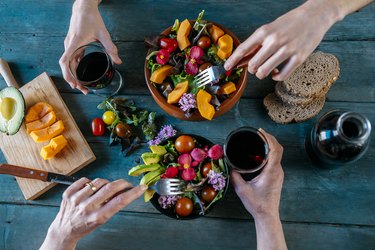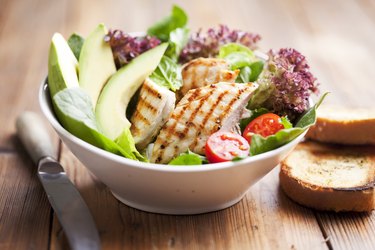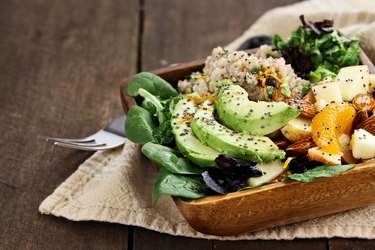
You've heard the terms "plant-based," "vegan" and "vegetarian" thrown around and they all sound pretty similar — yet they're not actually one and the same. So how does going vegetarian differ from a vegan diet? And is eating plant-based better than committing to vegetarianism?
Learn the differences between all three diets and discover if swapping meat for more plants might be right for you.
Video of the Day
Video of the Day
What Is a Plant-Based Diet?

There is no single, universally accepted definition of a plant-based diet. The general idea is primarily eating plants while allowing for small or occasional amounts of animal products, including meat. Some people refer to this eating plan as "chegan" — a play on words for a vegan who "cheats."
One thing is certain, though: This eating approach is on the rise. An impressive 32 percent of respondents say they eat less meat now than they did three years ago, a January 2016 survey conducted by National Public Radio (NPR) and Truven Health Analytics found. And among those who are curbing their meat intake, 60 percent cite health as their primary concern.
What's more, two-thirds of people reported eating less red and processed meat than they did during the previous three years, according to a July 2018 Cambridge University survey.
Dairy is also on the decline. The amount of milk people drank in North America plummeted 22 percent between 2006 and 2016, which paralleled a triple-digit increase in plant alternatives during that same period, a 2018 Cargill report shows. While most Americans aren't taking the leap to full-on vegetarianism or veganism, more and more are moving towards a plant-based diet.
This is important news for the planet — particularly in light of the EAT-Lancet Commission, a comprehensive report put together by nearly 40 world-leading scientists about the effect of what we eat on human health and the health of the planet. The commission advises increasing intakes of produce, legumes and nuts as well as minimizing intake of eggs, seafood, meat, poultry and dairy — an eating plan referred to as the planetary health diet.
On this diet, the recommended limit for red meat per week is no more than about three ounces, which is roughly the size of a deck of cards.
Pros
- It's linked to a lower risk of type 2 diabetes: A meta-analysis looked at plant-based eating patterns (where people eat more plant-based foods and fewer animal-based foods) and the incidence of type 2 diabetes. And plant-based dietary patterns were associated with a lower risk of type 2 diabetes, even after adjusting for body mass index (BMI), the July 2019 published in JAMA Internal Medicine found. In other words, the effect holds true regardless of weight. The link was even stronger when whole, plant-based foods were consumed, including fruits, vegetables, whole grains, legumes and nuts.
- It's tied to heart health and longevity: Sticking to a plant‐based diet most diligently was associated with a 19 percent lower risk of dying from heart disease, an August 2019 study in JAHA found. And plant-based diets were associated with lower levels of TMAO, a gut-microbial metabolite linked to a higher risk of heart disease, per a February 2020 study in the Journal of the American College of Cardiology. Plus, eating more plant proteins is linked to a lower risk of death, especially heart disease-related deaths, according to an August 2019 correlative study in JAMA Internal Medicine.
- It's maintainable: There's nothing truly off-limits on a plant-based diet, which makes it easier to stick to for many people.
Cons
- It's not well-defined: The lack of clear-cut limitations may leave some people floundering over exactly what to eat. Sharon Palmer, RDN known as the Plant-Powered Dietitian, encourages starting by filling 75 percent of your plate with plants and giving Meatless Mondays a try.
- It's linked to low calcium and vitamin D levels: A September 2020 study in The Journal of Nutrition found that those on a plant-based diet were more likely to have low calcium and vitamin D intakes, which increase markers of bone loss. To combat this, choose food products fortified with these nutrients or consider supplements.
Who Should Adopt a Plant-Based Diet?
"A plant-based diet is easy to follow and virtually everyone can eat this way," says Palmer. If you want to lower your carbon footprint, improve your health and eat more plants without swearing off any type of animal food completely, a plant-based diet is your best option.
While there are no hard-and-fast rules regarding the plant-to-animal foods ratio, remember that the key difference between being an omnivore and going plant-based is that the latter involves eating primarily plants.
Simply put, plants should be the star of every meal on a plant-based diet. So if you don't want to give up downing eggs for breakfast, a cold cut sandwich for lunch and a burger for dinner, then a plant-based diet may not be right for you.
What Is a Vegetarian Diet?

There are several different types of vegetarian diets. Ovo-vegetarians eat eggs as their only animal protein, while lacto-vegetarians eat dairy. Pescatarians eat seafood and plant foods. And lacto-ovo-vegetarians eat both dairy and eggs.
While vegetarianism is probably a diet you're familiar with, not many people adopt it. Only 5 percent of Americans identify as vegetarian, according to a 2018 Gallup poll.
Pros
- It's linked to weight loss and lower risk factors of metabolic diseases: Compared
to omnivores, vegetarians were observed to have significantly reduced levels of body mass index (BMI),
total cholesterol, "bad" LDL cholesterol and blood sugar, a June 2017 comprehensive review published in Critical Reviews in Food Science and Nutrition found. Researchers also noticed vegetarians had a significantly lower risk of death from heart disease and the incidence of cancer. Better still, the more plant-based your vegetarian diet is, the stronger the links, Palmer says.
- It's tied to heart health: A vegetarian diet rich in veggies, nuts and soy is linked to a lowered risk of total, ischemic and hemorrhagic strokes in people over 50, according to a February 2020 study in Neurology.
- It may benefit all types of people: A vegetarian diet can be safe and healthy at any age, even for pregnant or breastfeeding women, a December 2016 study published in the Journal of the Academy of Nutrition and Dietetics states.
Cons
- You may need to take supplements: Given the exclusion of many animal-based foods, vegetarians may be deficient in omega-3 fatty acids, iron, zinc, iodine, calcium, vitamin D and vitamin B12.
- It requires meal planning: If you decide to go vegetarian and fail to meal plan, you may end up missing out on these important nutrients, Palmer says. She cautions against simply replacing meat or seafood with cheese or eggs at every meal. "You'll consume a wider range of nutrients from eating more plants, including pulses, whole grains, vegetables, nuts and seeds," she advises.
Who Should Try Vegetarianism?
If you love plant foods but aren't ready to commit to giving up all animal-based foods like eggs, yogurt and cheese, a vegetarian diet is best for you.
"It's quite easy to follow vegetarianism today, as there are choices everywhere," says Palmer, who also notes that it's easier to meet the needs for certain nutrients on a vegetarian versus vegan diet, including omega-3s, calcium, vitamin D and B12.
What Is a Vegan Diet?

A vegan diet excludes all animal products. That means no meat, poultry, seafood, eggs or dairy — and even honey and gelatin are off the table.
But veganism generally goes beyond food. Most vegans embrace a lifestyle that involves avoiding any materials derived from animals, including leather, fur, wool and silk. Even household products, such as cosmetics and soaps, are excluded if they are made with animal-based ingredients or tested on animals.
Only 3 percent of American adults categorize themselves as vegan, up from 2 percent in 2012.
Pros
- It's linked to a lower risk of chronic diseases: The same cancer benefits tied to a vegetarian diet also apply here, according to the Critical Reviews in Food Science and Nutrition study, but a vegan diet was associated with an even greater reduction in cancer cases. What's more, vegan diets (and Mediterranean diets) emphasizing fruits, vegetables, grains and legumes, while reducing or eliminating animal products, was associated with a lower risk of asthma development and exacerbation, according to a March 2020 review in Nutrition Reviews. Dairy products were associated with an increased risk.
- It's eco-friendly: "All diets that promote eating fewer animal foods help human health, the environment and animals — but a vegan diet has the greatest effect on all three," Sherene Chou, RD and chair of the Academy of Nutrition and Dietetics' Vegetarian Practice Group, tells LIVESTRONG.com.
Cons
- It's very limited: Many seemingly innocent foods contain animal-based ingredients. Gelatin comes from animal bones, skin and tendons. Even added vitamin D3 in enriched foods is derived from fish or lanolin (which comes from sheep). Having fewer foods to pick from can make a vegan diet harder to stick to.
- You may need to take supplements: Like vegetarians, vegans may be deficient in omega-3s, iron, zinc, iodine, calcium, vitamin D and vitamin B12.
Who Should Go Vegan?
If you are ethically opposed to eating animals or any products they help produce — and you're totally environmentally conscious — a vegan diet is for you. This approach is also a great fit if you're interested in learning more about nutrition and the nutrient levels of various plant-based foods.
"The benefits of a vegan diet are all things you can feel really good about," says Palmer, who acknowledges that a vegan diet is the most difficult to follow because it's the most limited.
It is also the most challenging for meeting nutrient needs. For these reasons, Palmer and Chou both recommend seeking the guidance of a registered dietitian before starting a vegan diet.
Tips
- “Look for a dietitian who is focused on plant-based nutrition,” says Chou, who points out that this is a specialty area of practice. “You may need to take a vitamin B12 supplement, which a dietitian can recommend, and he or she will ensure that you’re getting enough calcium and other key nutrients,” Palmer explains.
- You can also grab a copy of Becoming Vegan, written by two veg-focused dietitians, Brenda Davis and Melina Vesanto, to get a better understanding of a vegan diet's nutritional demands.
- Try these seven best vegan cookbooks for recipe inspiration and easier cooking and baking.
- Gallup: "Snapshot: Few Americans Vegetarian or Vegan"
- Critical Reviews in Food Science and Nutrition: "Vegetarian, Vegan Diets and Multiple Health Outcomes: A Systematic Review With Meta-Analysis of Observational Studies"
- Journal of the Academy of Nutrition and Dietetics: "Position of the Academy of Nutrition and Dietetics: Vegetarian Diets"
- Cambridge University: "Reducing Meat Consumption in the USA: A Nationally Representative Survey of Attitudes and Behaviours"
- Truven Health Analytics: "Health Poll: Meat Consumption"
- Cargill: "The Shifting Global Dairy Market"
- EAT: "EAT-Lancet Commission Summary Report"
- JAMA Internal Medicine: "Association Between Plant-Based Dietary Patterns and Risk of Type 2 Diabetes"
- JAHA: "Plant‐Based Diets Are Associated With a Lower Risk of Incident Cardiovascular Disease, Cardiovascular Disease Mortality, and All‐Cause Mortality in a General Population of Middle‐Aged Adults"
- JAMA Internal Medicine: "Association of Animal and Plant Protein Intake With All-Cause and Cause-Specific Mortality"
- Journal of the American College of Cardiology: "Long-Term Changes in Gut Microbial Metabolite Trimethylamine N-Oxide and Coronary Heart Disease Risk"
- Neurology: "Vegetarian diet and incidence of total, ischemic, and hemorrhagic stroke in 2 cohorts in Taiwan"
- Nutrition Reviews: "The role of nutrition in asthma prevention and treatment"